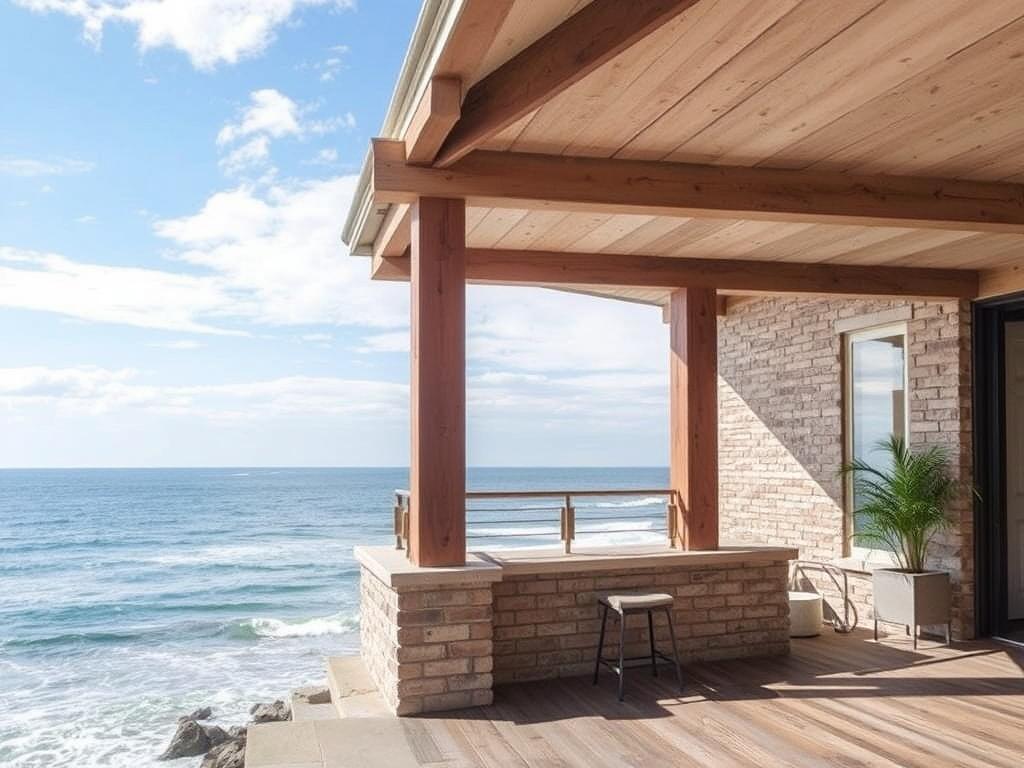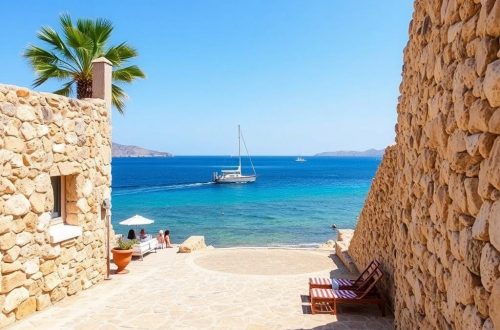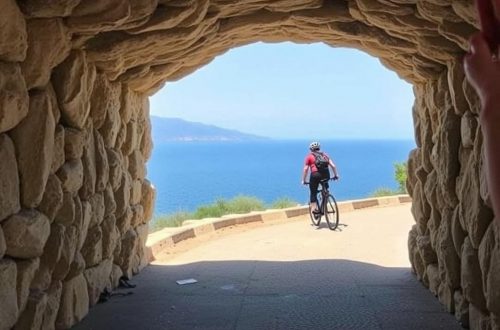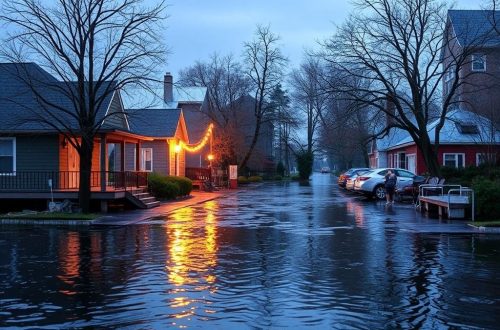
Protecting Your Home from Salt Air Corrosion on the Seafront
Living by the sea offers breathtaking views, fresh ocean air, and a unique lifestyle that many dream of. However, this idyllic setting comes with a significant challenge: salt air corrosion. The salty atmosphere, while refreshing, is extremely corrosive and accelerates the deterioration of buildings, especially metal components. For homeowners in coastal regions such as Cyprus, understanding salt air corrosion protection and seaside house upkeep is crucial to preserving property value and ensuring longevity.
This article delves into the mechanisms behind salt air corrosion and presents a detailed, practical guide to coastal home maintenance Cyprus homeowners can implement. Whether you are an owner of a newly built seafront property or an established residence, this comprehensive guide will provide you with expert advice on how to protect metal fixtures in Cyprus and maintain your home despite the aggressive marine environment.
Understanding Salt Air Corrosion: Causes and Effects
Salt air corrosion is primarily caused by the presence of salt-laden moisture that consistently interacts with building materials. Near coastal regions, airborne salt particles generated by ocean spray deposit on surfaces, creating a salt film that attracts water molecules from the atmosphere. This combination of moisture and salt accelerates electrochemical reactions, specifically oxidisation, leading to rust and structural degradation.
The effects on a seaside home are wide-ranging. Metal fixtures, from railings and window frames to outdoor furniture, undergo constant rusting. Concrete surfaces may display spalling as salts penetrate and disrupt internal reinforcement bars, causing them to expand and crack the structure. Paint finishes degrade faster, wood can decay due to trapped moisture, and electrical systems face risks from corroded wiring or components.
Corrosion can weaken structural integrity, lead to expensive repair bills, and diminish aesthetic appeal. The seafront’s unique climatic conditions mean that homeowners must not only address visible damage but also adopt preventive measures to slow deterioration processes.
Salt air corrosion is a relentless enemy to seaside homes, acting silently and progressively to undermine both strength and beauty.
Key Principles of Salt Air Corrosion Protection
The cornerstone of salt air corrosion protection lies in prevention and regular maintenance. The first principle is the use of corrosion-resistant materials. Stainless steel, aluminum alloys, fiberglass, and specially coated metals perform better in marine environments. For coastal home maintenance Cyprus residents should prioritize selecting these materials when renovating or building.
Secondly, creating physical barriers by applying protective coatings is essential. Paints with anti-corrosive properties, sealants, and galvanization can significantly delay corrosion onset. Proper surface preparation before coating – including cleaning, sanding, and rust removal – is vital to ensure adhesion and durability.
Thirdly, regular inspection and cleaning prevent salt accumulation. Salt deposits on surfaces should be washed away promptly, ideally with fresh water to flush the salt crystals out. These cycles reduce the corrosive effects and allow homeowners to catch early signs of damage before they worsen.
Lastly, environmental control techniques like installing windbreakers or landscaping can mitigate direct exposure to salt spray. Positioning sensitive fixtures away from prevailing winds or humid zones also adds a protective layer.
Preventing salt air corrosion requires strategic material choices, protective coatings, and vigilant maintenance to outmaneuver nature’s corrosive forces.
Practical Seaside House Upkeep Strategies
Effective seaside house upkeep combines hands-on measures with routine care plans. For homeowners committed to longevity, establishing a maintenance schedule suited to the local climate is crucial. In Cyprus, with its specific coastal weather patterns, adaptations tailored to heat, humidity, and sudden storms increase effectiveness.
Regular cleaning routines should include:
- Washing metal surfaces with a hose or pressure washer using fresh water at least once a month.
- Inspecting and removing visible rust or paint breakdown immediately.
- Lubricating locks, hinges, and moving parts to prevent stiffness and rust.
- Checking sealants around windows, doors, and other vulnerable joints annually and renewing where cracks appear.
Seasonal maintenance can also embrace:
- Professional inspections of roof, gutters, and drainage systems to prevent moisture build-up.
- Periodic repainting of metal surfaces using anti-corrosive paints, especially in areas with heavy exposure.
- Replacing outdated metal fixtures with corrosion-resistant alternatives.
- Treating wooden parts to repel salt moisture and decay.
This consistent approach prevents small issues from escalating, securing your home’s structure and aesthetic appeal over time.
Materials and Coatings Best Suited for Coastal Environments
Choosing the correct materials can make salt air corrosion protection manageable. Metals like galvanized steel are widely used but must be periodically maintained. Stainless steel grades 316 and above are preferred in seafront areas due to their molybdenum content, which significantly enhances corrosion resistance.
In addition to metals, modern composites and plastics have found their place in coastal home construction thanks to their inert properties. Fiberglass doors, PVC windows, and composite decking can withstand salty atmospheres better than traditional materials.
Protective coatings require careful consideration. There are several types of paints and sealants developed specifically for anti-rust purposes. Epoxy primers, polyurethane topcoats, and zinc-rich primers provide multiple layers of defense when applied correctly.
| Material Type | Corrosion Resistance | Typical Uses |
|---|---|---|
| Stainless Steel (Grade 316) | High | Door hardware, railings, fixtures |
| Galvanized Steel | Moderate | Structural supports, roofing |
| Aluminum Alloys | Good | Window frames, outdoor furniture |
| Fiberglass/Composites | Very High | Doors, decks, panels |
| Anti-Rust Paints | Variable (depends on application) | All metal surfaces |
Material selection paired with appropriate protective coatings is the frontline defense against intense coastal corrosion.
Advanced Techniques for Protecting Metal Fixtures Cyprus Homeowners Should Know
Metal fixtures on seafront homes suffer the most from salt air corrosion. Besides the traditional methods of cleaning and painting, advanced techniques have emerged that significantly extend service life.
Cathodic protection is one such method, where a sacrificial anode made from magnesium or zinc is attached to the metal fixture. This anode corrodes instead of the essential fitting, effectively “sacrificing” itself to protect the metal structure. This technique is widely used for marine vessels but can be adapted for fixed coastal fixtures.
Another innovative approach involves nano-coatings that provide hydrophobic (water-repelling) surfaces, minimizing saltwater retention. These coatings are thin, transparent, and maintain the metal’s aesthetic while offering powerful protection against moisture and oxidation.
Regular application of corrosion inhibitors, either as additives in paint or as spray-on solutions, also prevents the electrochemical reactions responsible for rust formation. These can be especially useful for structures that cannot be easily removed or repaired.
Modern corrosion protection methods like cathodic protection and nano-coatings offer pioneering solutions to extend fixture lifespan in seaside homes.
Special Considerations for Coastal Home Maintenance Cyprus
Cyprus, with its unique Mediterranean climate, presents specific challenges and opportunities in seaside house upkeep. The combination of dry, hot summers and mild, wet winters means that salt air corrosion protection measures must be adapted seasonally.
During the long summer months, increased temperature and strong UV radiation accelerate paint deterioration and cause expansion of materials, potentially cracking protective coatings. Coastal home maintenance Cyprus experts recommend applying UV-resistant paints and using materials able to withstand thermal cycling.
The winter months bring moist winds and occasional heavy rains, increasing the risk of saltwater seeping into cracks and joints. Timely checking and repairing of weatherstripping, as well as ensuring drainage systems are clear and efficient, are vital to minimizing water intrusion and preventing corrosion beneath surfaces.
Moreover, Cyprus’ local building codes and environmental regulations place emphasis on sustainable materials and methods to harmonise with the coastal ecosystem. This encourages the use of environmentally friendly anti rust tips Cyprus homeowners and contractors should consider, such as non-toxic coatings and natural preservatives.
Essential Anti Rust Tips Cyprus Residents Should Apply
Combating rust on coastal properties is an ongoing battle for Cyprus homeowners. Knowing the right anti rust tips Cyprus professionals endorse can save considerable time and money.
- Immediate salt removal: Rinse and clean metal surfaces after exposure to sea spray, especially during storms.
- Use rust converters: For areas already affected by rust, applying a rust converter chemically transforms iron oxide into a protective layer, preventing further spread.
- Maintain paint layers: Skip repainting at your peril; paint acts as the first line of defense against corrosive elements.
- Inspect hidden areas: Rust often starts in places out of sight, like undersides of railings or behind fixtures—check these regularly.
- Replace corroded elements: Do not delay the replacement of severely rusted metal parts to avoid compromising overall structural health.
Timely treatment and diligent upkeep of metal surfaces prevent minor rust problems from escalating into costly damages.
The Role of Landscaping and Design in Seaside House Protection
Landscaping and thoughtful architectural design are often overlooked components of salt air corrosion protection. By creating natural barriers and placing sensitive parts of the home strategically, owners can reduce corrosion exposure.
Planting shrubs and trees that thrive in saline conditions can act as windbreaks, lowering the direct impact of salt spray on the house’s exterior. Selecting native vegetation that requires minimal watering also supports eco-friendly upkeep consistent with local climate.
In terms of design, slightly elevating the building and ensuring proper venting reduces moisture accumulation. Using overhangs to shield walls and metal fittings from direct rain and spray further prevents corrosion damage. Additionally, selecting window and door locations with fewer exposures to prevailing coastal breezes makes a considerable difference in longevity.
Good drainage plans, including sloping grounds away from foundations and using permeable paving, help prevent water stagnation that can accelerate corrosion-related damage.
Developing a Long-Term Maintenance Plan for Coastal Homes
Lack of foresight in seaside house upkeep leads to costly repair bills and accelerated deterioration. Homeowners must adopt a structured long-term maintenance plan that includes frequent inspections, preventive treatments, and documentation of repairs and changes.
Such a plan should feature:
- Biannual comprehensive inspections focusing on metal components, paints, wood condition, and seals.
- Scheduled professional evaluations of roofing, gutters, and drainage systems.
- Regular application of anti-corrosion treatments and repainting cycles tailored to local climatic conditions in Cyprus.
- A logbook documenting maintenance activities, warnings, defects, and corrective actions.
- Budgeting for replacement of fixtures that reach end-of-life corrosion damage.
Proactive monitoring and planned interventions minimize unexpected emergencies and ensure that salt air corrosion protection is consistent and effective over the property’s lifespan.
Planning for the future is the best defense against the relentless assault of salt air corrosion on coastal homes.
Your Seafront Investment Deserves Optimal Care and Protection
Owning a home by the seafront is a rewarding yet challenging commitment. The relentless nature of salt air corrosion requires an informed approach to coastal home maintenance Cyprus locals and visitors alike must embrace. By understanding the chemical and physical causes of corrosion, selecting appropriate materials, performing regular cleaning and inspections, and implementing advanced protection methods, homeowners can ensure their seaside property retains both value and beauty.
Moreover, integrating landscaping strategies and embracing sustainable practices reflects respect for the environment and enhances the home’s resilience. Those who invest in a long-term upkeep plan not only save on costly repairs but also enjoy peace of mind knowing their coastal sanctuary is safeguarded against the elements. Protect metal fixtures Cyprus specialists recommend, apply anti rust tips Cyprus experts endorse, and perform diligent seaside house upkeep to truly defend your treasure against the damaging effects of salt air.
Ultimately, your seafront investment deserves this optimal care and protection so you can fully enjoy the coastal lifestyle without compromise.
Frequently Asked Questions (FAQs)
- What is the best way to prevent salt air corrosion on metal fixtures?
Regularly rinse metal fixtures with fresh water to remove salt deposits, apply anti-corrosive coatings, and consider using corrosion-resistant materials like stainless steel grade 316. - How often should I inspect my coastal home for corrosion damage?
Inspections should be conducted at least twice per year, ideally during spring and autumn, to catch early signs of rust and material degradation. - Are there specific paints recommended for seaside house upkeep in Cyprus?
Yes, use paints designed for marine or coastal environments, such as epoxy primers, polyurethane topcoats, or zinc-rich primers that provide durable protection against salt air. - Can landscaping really help protect my home from salt air corrosion?
Absolutely. Windbreaks created by salt-tolerant shrubs and trees reduce salt spray exposure and help protect vulnerable surfaces from direct contact. - What advanced techniques exist for protecting metal fixtures from corrosion?
Techniques like cathodic protection and nano-coatings can significantly increase resistance of metal fixtures to salt air corrosion. - Is it necessary to replace corroded fixtures or can treatment be enough?
Minor corrosion can be treated with rust converters and repainting, but severely corroded fixtures should be replaced to ensure structural safety. - How can I adapt my coastal home maintenance to Cyprus’s climate specifically?
Use UV-resistant materials during hot summers, ensure effective drainage before winter rains, and apply environmentally friendly anti rust products in line with local regulations.





